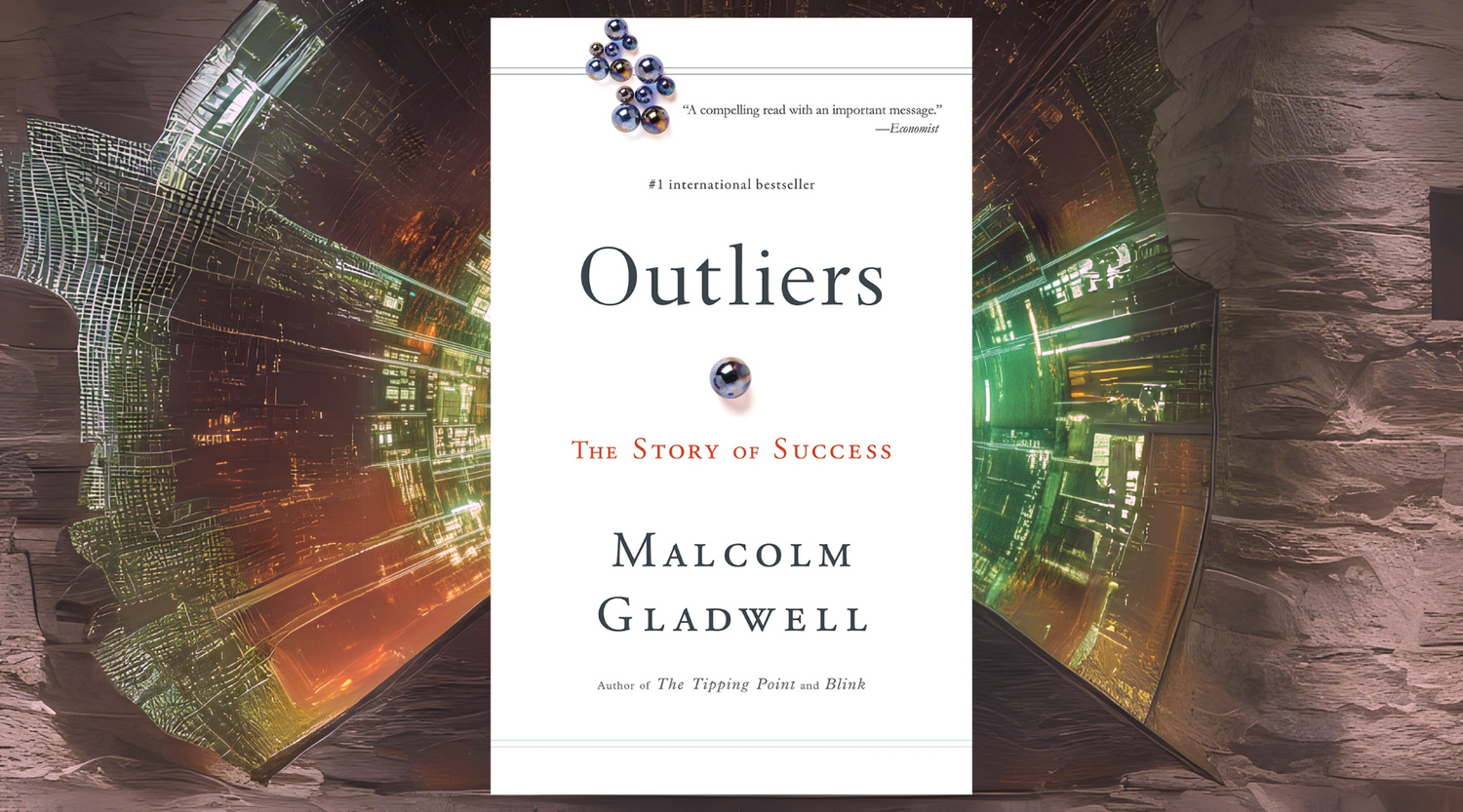Outliers: The Story of Success
By Malcolm Gladwell
Outliers takes a deeper look into why some people achieve extraordinary success. Malcolm Gladwell argues that success isn’t just about individual talent or hard work but is heavily influenced by external factors like cultural background, family, timing, and opportunity.
This book might make you rethink about the people who get to the top of their fields, such as Bill Gates and Steve Jobs. It shows how much luck and circumstance affects outcomes for people at the top of their field. This luck shouldn’t be used to take away from these individuals accomplishments because they still had to put in the work to realize those accomplishments. But circumstances had to take place for them to even have the opportunity to put in the work.

The “10,000-hour” rule from Outliers says that to become an expert in something you need about 10,000 hours of practice. It’s not just hard work. Just having the chance to practice that much, like the Beatles playing long gigs or Bill Gates having access to coding at an early age, depends on luck, timing, and support to go along with the hard work.
"Imagine that every year, there was a Math Olympics in some fabulous city in the world. And every country in the world sent its own team of one thousand eighth graders. We could predict precisely the order in which every country would finish in the Math Olympics without asking a single math question. All we would have to do is give them some task measuring how hard they were willing to work. In fact, we wouldn't even have to give them a task. We should be able to predict which countries are best at math simply by looking at which national cultures place the highest emphasis on effort and hard work." ~ Malcolm Gladwell, Outliers
Here are the main stories that Outliers looks into:
- The Beatles: In the early 1960s, the Beatles played hundreds of long shows in Hamburg, Germany clubs. This intense practice, over 1,200 performances, gave them thousands of hours to perfect their music, helping them become one of the greatest bands ever.
- Bill Gates: As a teenager in the late 1960s and early 1970s, Bill Gates had rare access to computers at his private school and nearby university. This early start, when most people couldn’t use computers, let him practice programming a ton, setting him up to create Microsoft.
- Canadian Hockey Players: In Canada, young hockey players are grouped by birth year, with a January 1 cutoff. Kids born early in the year are older and stronger, so they get picked for better teams, get more coaching, and have a better shot at becoming pros.
- Jewish Immigrants in New York: In the early 1900s, many Jewish immigrants worked in New York’s clothing industry. Their hard work and focus on education for their kids led to many becoming successful lawyers and doctors by the mid-20th century.
- Korean Air Crashes: In the 1990s, Korean Air had several plane crashes. Gladwell explains that Korean culture’s respect for authority made pilots and crew hesitant to challenge mistakes, causing errors. The airline later made changes to improve communication and safety.
- Asian Rice Farmers: In Asian countries, rice farming is very hard and requires constant attention. This work ethic, passed down through generations, helps Asian students study hard and excel in subjects like math, even in modern schools.
- Robert Oppenheimer: In the 1940s, J. Robert Oppenheimer led the Manhattan Project to build the atomic bomb. His wealthy background and ability to charm people helped him succeed, unlike other brilliant scientists who struggled with social skills.
- Chris Langan: Chris Langan has a super-high IQ but grew up poor with little support. Without the right opportunities or guidance, he never achieved big success, showing how even geniuses need help to thrive.
- Harlan, Kentucky Feuds: In the 1800s, families in Harlan, Kentucky, often fought violently because of a “culture of honor” from their ancestors. This tradition, rooted in defending family pride, shows how old habits can shape behavior for generations. ~ Malcolm Gladwell, Outliers
"Success is a function of persistence and doggedness and the willingness to work hard for twenty-two minutes to make sense of something that most people would give up on after thirty seconds."
Outliers: The Story of Success
Malcolm Gladwell's groundbreaking exploration of what makes high-achievers different. Discover the hidden factors behind extraordinary success, from the 10,000-hour rule to the power of timing, cultural background, and opportunity. A fascinating look at the real story behind greatness.
View on AmazonMy Thoughts on Outliers
Outliers was an easy to read yet very interesting book that does a great job explaining the “10,000 Hours” rule that I’ve been hearing about. These stories show how much luck is involved for people that end up achieving great success. It doesn’t discount the work that is put in by these people either, it just simply shows that these people fell into situations that gave them the ability to put in the 10,000 hours needed for their achievements. It’s a short book and is something that I will be recommending when people ask me for a book recommendation.
If you enjoyed this book or my summary and review of Outliers, I would recommend checking out my review of The Psychology Of Money, by Morgan Housel. It has a similar theme but is based more around personal finances.










Leave a comment
This site is protected by hCaptcha and the hCaptcha Privacy Policy and Terms of Service apply.